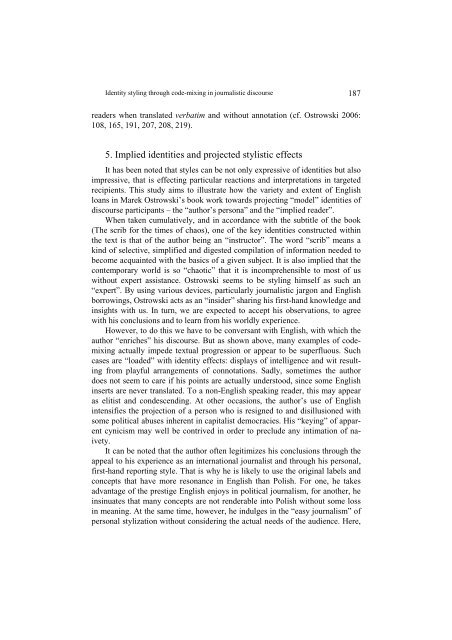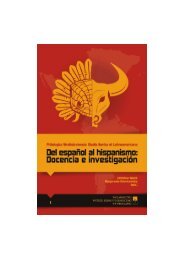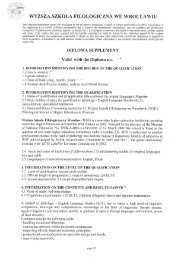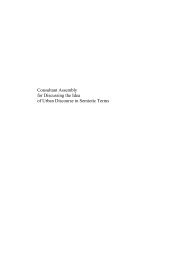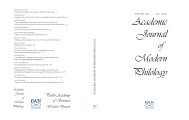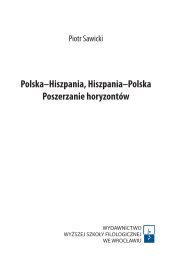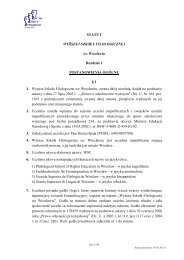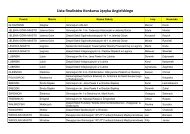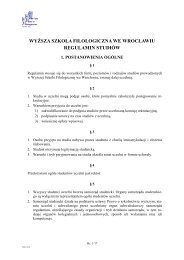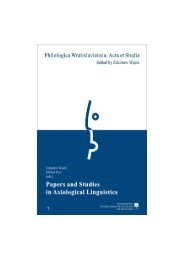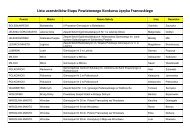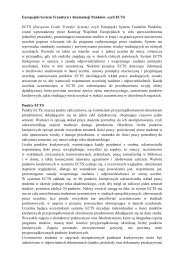s - Wyższa SzkoÅa Filologiczna we WrocÅawiu
s - Wyższa SzkoÅa Filologiczna we WrocÅawiu
s - Wyższa SzkoÅa Filologiczna we WrocÅawiu
Create successful ePaper yourself
Turn your PDF publications into a flip-book with our unique Google optimized e-Paper software.
Identity styling through code-mixing in journalistic discourse 187<br />
readers when translated verbatim and without annotation (cf. Ostrowski 2006:<br />
108, 165, 191, 207, 208, 219).<br />
5. Implied identities and projected stylistic effects<br />
It has been noted that styles can be not only expressive of identities but also<br />
impressive, that is effecting particular reactions and interpretations in targeted<br />
recipients. This study aims to illustrate how the variety and extent of English<br />
loans in Marek Ostrowski’s book work towards projecting “model” identities of<br />
discourse participants – the “author’s persona” and the “implied reader”.<br />
When taken cumulatively, and in accordance with the subtitle of the book<br />
(The scrib for the times of chaos), one of the key identities constructed within<br />
the text is that of the author being an “instructor”. The word “scrib” means a<br />
kind of selective, simplified and digested compilation of information needed to<br />
become acquainted with the basics of a given subject. It is also implied that the<br />
contemporary world is so “chaotic” that it is incomprehensible to most of us<br />
without expert assistance. Ostrowski seems to be styling himself as such an<br />
“expert”. By using various devices, particularly journalistic jargon and English<br />
borrowings, Ostrowski acts as an “insider” sharing his first-hand knowledge and<br />
insights with us. In turn, <strong>we</strong> are expected to accept his observations, to agree<br />
with his conclusions and to learn from his worldly experience.<br />
Ho<strong>we</strong>ver, to do this <strong>we</strong> have to be conversant with English, with which the<br />
author “enriches” his discourse. But as shown above, many examples of codemixing<br />
actually impede textual progression or appear to be superfluous. Such<br />
cases are “loaded” with identity effects: displays of intelligence and wit resulting<br />
from playful arrangements of connotations. Sadly, sometimes the author<br />
does not seem to care if his points are actually understood, since some English<br />
inserts are never translated. To a non-English speaking reader, this may appear<br />
as elitist and condescending. At other occasions, the author’s use of English<br />
intensifies the projection of a person who is resigned to and disillusioned with<br />
some political abuses inherent in capitalist democracies. His “keying” of apparent<br />
cynicism may <strong>we</strong>ll be contrived in order to preclude any intimation of naivety.<br />
It can be noted that the author often legitimizes his conclusions through the<br />
appeal to his experience as an international journalist and through his personal,<br />
first-hand reporting style. That is why he is likely to use the original labels and<br />
concepts that have more resonance in English than Polish. For one, he takes<br />
advantage of the prestige English enjoys in political journalism, for another, he<br />
insinuates that many concepts are not renderable into Polish without some loss<br />
in meaning. At the same time, ho<strong>we</strong>ver, he indulges in the “easy journalism” of<br />
personal stylization without considering the actual needs of the audience. Here,


